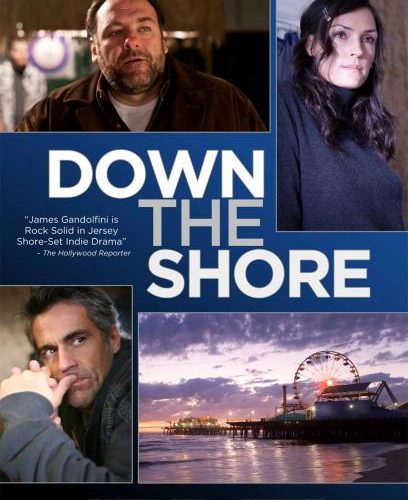After a longtime career as acting coach for the likes of Jet Li, Harold Guskin heads behind the camera for his directorial debut Down the Shore with the help of a contemporary acting giant at its lead. For James Gandolfini, life after The Sopranos has seen moderate success in roles not too far removed from his iconic Tony besides a much heavier infusion of comedy. In that vein, his boisterous, crude, and psychologically tormented assassin in Killing Them Softly showed a softer side of insecurity that was an intriguing bit of against-character nuance I personally hoped would come out more when not typecast into embodying showy, egomaniacal, jerks like in The Incredible Burt Wonderstone. There’s more to the actor’s repertoire than we’ve seen and it’s comforting to know he’s willing to go independent to show it.

Guskin’s debut seems the perfect venue to showcase this immense talent through a blue-collar Jersey boy with more than a few ghosts in his closet. Gandolfini’s Bailey has had a tough life being raised by an abusive, sociopathic father in a town where his only avenue for rebellion was to become a delinquent on the fast track to evolving into a carbon copy with nothing but the bottle left for solace. He’s a broken shell now living to protect and care for his sister Susan (Maria Dizzia) by running and maintaining his best friend Wiley’s (Joseph Pope) decrepit amusement park down by the beach. The news of her passing therefore becomes the final straw leaving him with nothing—not even the ability to forgive himself for his part in her demise.
It’s actually Susan who ushers in the film on vacation in France. Roaming wherever her guidebook suggests, she finds comfort in the joyful smiles of children catching rings on one of the last hand-cranked merry-go-rounds in Europe. We aren’t yet aware of her background or how her brother also entertains children at his own park and thus watch open-mindedly as she engages with the ride’s operator Jacques (Edoardo Costa). A genial, gregarious man, ‘Jack’ charms his way into walking her to a café for a glass of wine, an innocent enough action until she leafs through her purse full of cash. Jacques eyes open wide—if only for a second—as we begin to think the worst. The fact he then also ends up telling Bailey she has died three months later only raises our suspicions more.
With this blatant attempt to confuse—or at least plant a seed of wrongdoing—Down the Shore begins to show its strings. Every mystery and every covered-up lie we’re exposed to is introduced on a silver platter for our consumption. Very few moments inside Sandra Jennings’ script feel natural, straight down to Famke Janssen’s doe-eyed Mary and her special needs son Martin (John Magaro). Mary’s affinity for Bailey—her childhood neighbor—is as apparent upon finding him passed out drunk in the sand as her disgust for husband Wiley is when he plays rough with their son. While I’d love to say there’s more to this trio of friends than meets the eye I can’t because you’d have to be blind not to see. It’s not a question of if feelings will be revealed, but when.

We’re given so many transparent attempts at suspense and what ifs that it becomes impossible to let the film draw you in. Every frame is dripping in stilted dialogue and obvious construction that it’s hard to care about anything other than reaching its inevitable end as attempts at intelligent storytelling prove nothing but cute clichés and awkward situations. Is Martin being handicapped some sort of karmic retribution for his parents’ loveless union? Is the dark secret keeping Bailey and Wiley friends more blackmail than bond? Does Jacques coming to America at the behest of Susan on her deathbed to live with and help Bailey a con or a genuine portrayal of compassion? Are any of these characters worth our time or are they just selfishly butting into each other’s lives?
I’m going to chalk it up to inexperience and a steep learning curve because Jennings (with only television movie credits to her name) and Guskin are newcomers to building a feature film. Down the Shore works when allowed to be quiet and introspective—two qualities left by the wayside in lieu of a desire for more. There’s too much excess from Magaro’s performance treading very close to caricature, Pope’s underlying anger boiling way too close to the surface to become caricature, and the script’s need to introduce Jacques’ foreigner to the fold as a sounding board for the audience to learn the secrets Bailey, Wiley, and Mary already know. I often felt I was being led along an overly sloping road to revelations when a quick A to B would have sufficed.
Not without production value, its gorgeous views of the desolately cold New Jersey landscape and dark, broken carnival rides do help express the tragically downtrodden life led by its native sons. As a result, Gandolfini’s constant wrestling with where his Bailey has come from and the glaring lack of options about where to go is singularly authentic. Brought to tears more than once, it’s his acceptance of the past and the acknowledgement his sister is now gone that necessary to break through the psychological wall he’s built of solitude. He and Costa’s Jacques are the two characters changed forever by Susan’s death and it’s their selfless natures that drive the plot forward with performances much greater than the whole. It’s a valiant effort on their part, but the weight was too much.
Down the Shore opens in NY and LA on Friday, April 5th.

